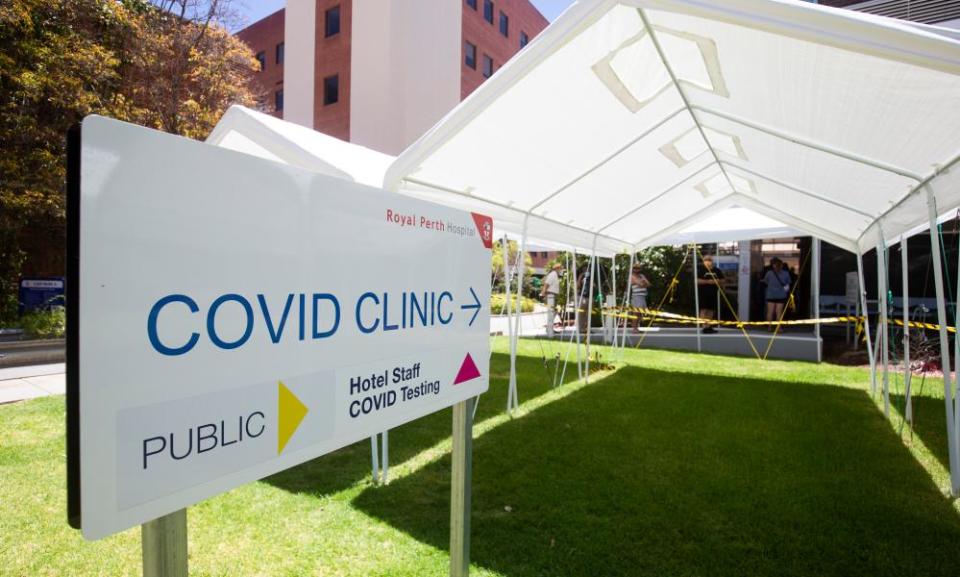Liberal MP Andrew Laming suggests overhauling hotel quarantine with resort stays

Effective Covid-19 vaccines could see Australia’s tourism industry boosted by shorter periods in quarantine and even holidays beginning in resort-style facilities, under a plan by Liberal MP Andrew Laming.
Laming told Guardian Australia that national cabinet should also expand hotel quarantine to allow more Australians to return home and lift caps on the number of people arriving from overseas providing they have been vaccinated.
But medical experts including the acting chief medical officer, Prof Michael Kidd, have said it is too early to say if the Pfizer and AstraZeneca vaccines prevent transmission and could see quarantine measures relaxed.
Related: Covid vaccine ad campaign aims to reassure Australians about safety and efficacy of jabs
Jane Halton, who conducted the national review into the system in October, said hotel quarantine would be needed “until we have a significant proportion of our population vaccinated”.
But once vulnerable populations had been vaccinated in Australia, “the conversation will change … there will come a point we ask ourselves: do we continue to close ourselves off to rest of world?”, she told the Guardian.
On Wednesday, Kidd said health authorities were still studying whether vaccinated individuals “may still be able to transmit Covid-19 to other people” and how long vaccine immunity lasts. Changes to hotel quarantine were “still a fair way down the track”, he told reporters in Canberra.
Dr Paul Griffin, an infectious diseases expert at Mater Health, agreed that an overhaul of hotel quarantine was “a little optimistic and some way off”.
Griffin said that while we “don’t know” whether vaccines directly reduce transmission, they may “indirectly impact transmission” by reducing symptoms such as coughing, which spread droplets carrying Covid-19.
“It is likely that once vaccinations are widespread, if we do see an impact in epidemiological studies on transmission, perhaps our quarantine could be more risk-based.
“For people from somewhere low-risk, if the risk is further reduced by vaccination, it could mean quarantine is titrated more specifically to risk.”
Laming said it was “unfortunate that extremely isolated cases of hotel quarantine outbreaks of a single case have caused significant concerns for states, making them reluctant to expand the process”.
Related: Queensland's decision to reopen border with NSW takes Gladys Berejiklian by surprise
“While we’re continuing to better understand the virus, the only hope for normalising global movement is to expand hotel quarantine. I see little reason not to allow Australians to urgently repatriate where they need to, which they currently can’t.”
Laming said he “sees a day where if someone was vaccinated, had a proven serological response and a negative rapid test, they may be able to quarantine in a different fashion or for a shorter period of time”.
“If you halve a quarantine period, you double the number of people you can process.”
Laming said changes could include home quarantine with monitoring, or “resort-style arrangements where those who start in quarantine on the same day could stay together at a facility at the start of a longer holiday”.
He conceded that “won’t be happening tomorrow” but said there was “light at the end of the tunnel” for struggling tourism businesses, with regional tourism in particular to benefit from resort-style quarantine.
Prof Gregory Dore, an infectious diseases physician at Sydney’s St Vincent’s Hospital and program head of the Kirby Institute, said hotel quarantine was “very likely to be maintained for most of 2021, at least until the Australian Covid-19 vaccine rollout is complete”.
“Even if returned travellers have been vaccinated, they still could be infected,” he said.
“There is also no evidence the incubation period would be shorter in vaccine breakthrough cases. Thus, the 14-day period should remain, along with routine testing on day two and 10.”
Halton agreed that “if people are coming into the country, even if they’re vaccinated – unless we’re confident they’re not infecting others – we will need hotel quarantine until we have a significant proportion of our population vaccinated”.
Related: I'm 20 and stressing to the point of getting grey hair. It's too much | Jake Turner
Even then, “everyone in Australia will need to be careful about minimising the risk of transmission”.
Halton predicted that because vaccines would “prevent severe disease and death in the overwhelming proportion of the population [that will be vaccinated] … the conversation will change”.
Coalition MPs including Warren Entsch and Llew O’Brien have called for the Morrison government to extend economic support to the tourism industry after jobkeeper expires in March. The Queensland premier, Annastacia Palaszczuk, also said there was a case to be made to retain jobkeeper for tourism operators “doing it tough”. The federal tourism minister, Dan Tehan, confirmed further support was under consideration.
Various MPs including Tim Wilson, Trent Zimmerman and Dave Sharma have raised the restrictive international arrival cap in the Coalition party room.
On 22 January, national cabinet declined to raise the cap after the number of arrivals was slashed by 2,500 a week at its 8 January meeting in response to new, more infectious strains of coronavirus.

 Yahoo Finance
Yahoo Finance 